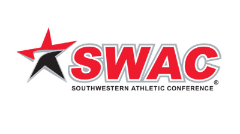 BIRMINGHAM, Ala. – The Southwestern Athletic Conference has issued an official response to the latest NCAA Academic Progress Rates.
BIRMINGHAM, Ala. – The Southwestern Athletic Conference has issued an official response to the latest NCAA Academic Progress Rates.
“In comparison to last year’s report, with the teams that have submitted adaptable data, the Southwestern Athletic Conference applaud the improvements by our member institutions and the standards they have implemented to solve the academic concerns,” said SWAC Commissioner Duer Sharp. “As we support success on the field, we will continue to emphasize the importance of improving academic scores and APR measures.”
Seven teams within six member schools, with accurate and applicable data submitted, suffered penalties based on the APR data from 2012-2013. The NCAA released the list through an online post on NCAA.org. All teams at Southern are currently ineligible for post-season competition due to unusable data which moves the league’s count to 22 teams.
Last year, 15 programs among seven institutions were penalized due to APR.
SWAC member institutions and programs penalized with postseason ineligibility include: Alabama A&M (Men’s Golf), Alabama State (Men’s Basketball and Football) – Mississippi Valley State (Baseball and Football) – Southern (All sports based on unusable data) – Prairie View A&M (Football) – Arkansas at Pine Bluff (Football).
Alcorn State women’s volleyball was handed a level-one penalty but maintained its postseason eligibility.
Texas Southern University president Dr. John Rudley, Chairman of the SWAC Council of Presidents and Chancellors, added, “The average graduation rate for all students at Historically Black Colleges and Universities (HBCUs) is 36 percent. The NCAA’s APR requiring a graduation rate for student athletes of 50 percent or better is set so high that most HBCU’s and other limited resource institutions cannot meet that standard.”
Rudley also explained, “The large, well-funded universities have hired large compliance staffs who literally escort athletes to class each day to meet the increased requirements. Our smaller institutions are severely handicapped without budgets to hire personnel for compliance and academic support. These increased regulations make it almost impossible for small schools with specialized missions to compete.”
“We are proud of what our Historically Black Colleges and Universities have achieved over the years, before and after segregation, with respect to transforming the lives of people of color and providing access to a college degree for under served students when others have not had such a mission,” said Rudley. “This is a case of one size cannot fit all, and the NCAA needs to continue to look for ways to ensure that the needs of all its member universities and our student athletes can be met.”



